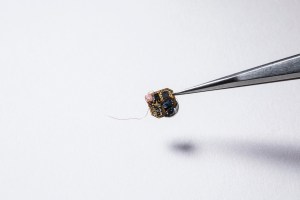Could they ‘bee’ anymore helpful.
Bumblebees, which already help producers pollinate crops, are now being used by engineers at the Paul G. Allen School of Computer Science & Engineering at the University of Washington to carry small sensor packages, that farmers may be able use to collect data from their crops one day.
The sensor ‘backpack’ known as Living IoT is the first wireless sensing system small enough to ride aboard a bumblebee.
Researchers believe this could be a step up from the drones farmers currently use to soar over huge fields to monitor temperature, humidity or crop health as bees can fly for hours compared to the 10 to 20 minutes, producers typically get from flying a drone.
The small rechargeable battery in the sensor package can last up to seven hours of flight and then conveniently recharge while the bees are in their hive at night. They can currently store about 30 kilobytes of data.
However, the team is hoping to counter the small amount data it can collect by developing backpacks with cameras that can livestream information about plant health back to farmers.
Shyam Gollakota is a senior author on the project and an associate professor.
“We showed for the first time that it’s possible to actually do all this computation and sensing using insects in lieu of drones,” said Gollakota.
RELATED ARTICLES: VIDEO: Technology Access Centre comes to Olds College
Farming Smarter: Autonomous Vehicles in the Field
Co-author Rajalakshmi Nandakumar, a doctoral student in the Allen School, says the backpack weighs about 102 milligrams, the equivalent of seven grains of uncooked rice.
“The rechargeable battery powering the backpack weighs about 70 milligrams, so we had a little over 30 milligrams left for everything else, like the sensors and the localization system to track the insect’s position,” said Nandakumar.
Coauthor Sawyer Fuller, an assistant professor in the UW Department of Mechanical Engineering, says it will be interesting to the travel habits of bees.
“It would be interesting to see if the bees prefer one region of the farm and visit other areas less often,” said Fuller adding, “alternatively, if you want to know what’s happening in a particular area, you could also program the backpack to say: ‘Hey bees, if you visit this location, take a temperature reading.”
For more on the research click here.
 Caption: The UW team designed a sensor “backpack” that weighs 102 milligrams.
Caption: The UW team designed a sensor “backpack” that weighs 102 milligrams.Credit: Mark Stone/University of Washington
